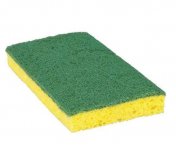Packard
Member
Until this morning, I thought eraser sponges worked chemically. It turns out that they work mechanically like sand paper does.
Questions: What is the hardness of these abrasive particles? Can I use it on glass without worry of scratching the surface?
What does it leave behind? Can I use it to prep for applying a finish?
And finally, how well do these sponges work for ordinary cleaning?
I would note that while Mr. Clean seems to have brought these to the market, apparently is is not a patented item and others are offering less expensive variants.
The Martha Stewart article linked below prompted these questions. It raises more questions than it answers, and it appears to be truncated from a larger and longer discussion.https://www.marthastewart.com/8034078/magic-eraser-tips
Questions: What is the hardness of these abrasive particles? Can I use it on glass without worry of scratching the surface?
What does it leave behind? Can I use it to prep for applying a finish?
And finally, how well do these sponges work for ordinary cleaning?
I would note that while Mr. Clean seems to have brought these to the market, apparently is is not a patented item and others are offering less expensive variants.
The Martha Stewart article linked below prompted these questions. It raises more questions than it answers, and it appears to be truncated from a larger and longer discussion.https://www.marthastewart.com/8034078/magic-eraser-tips

